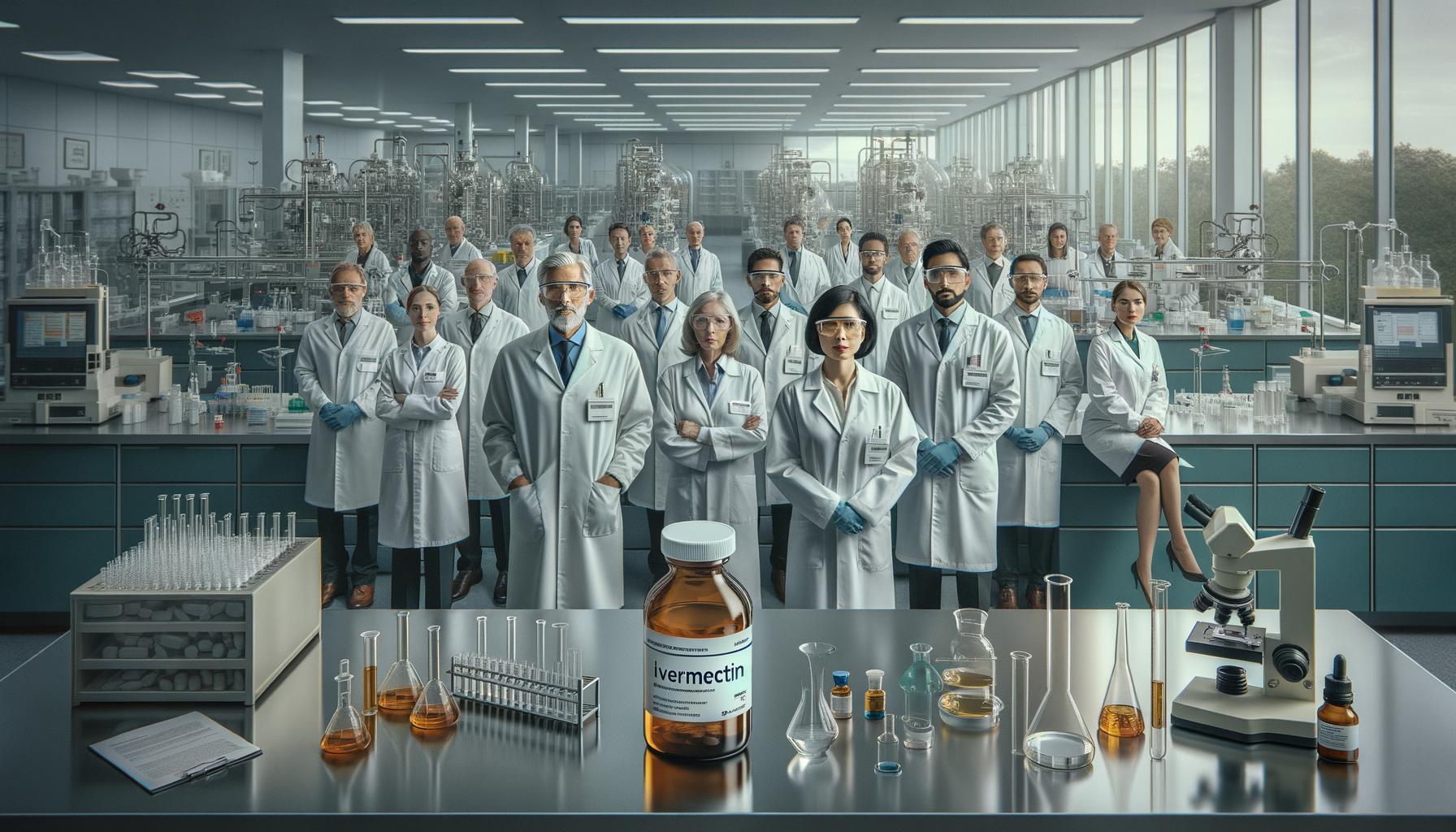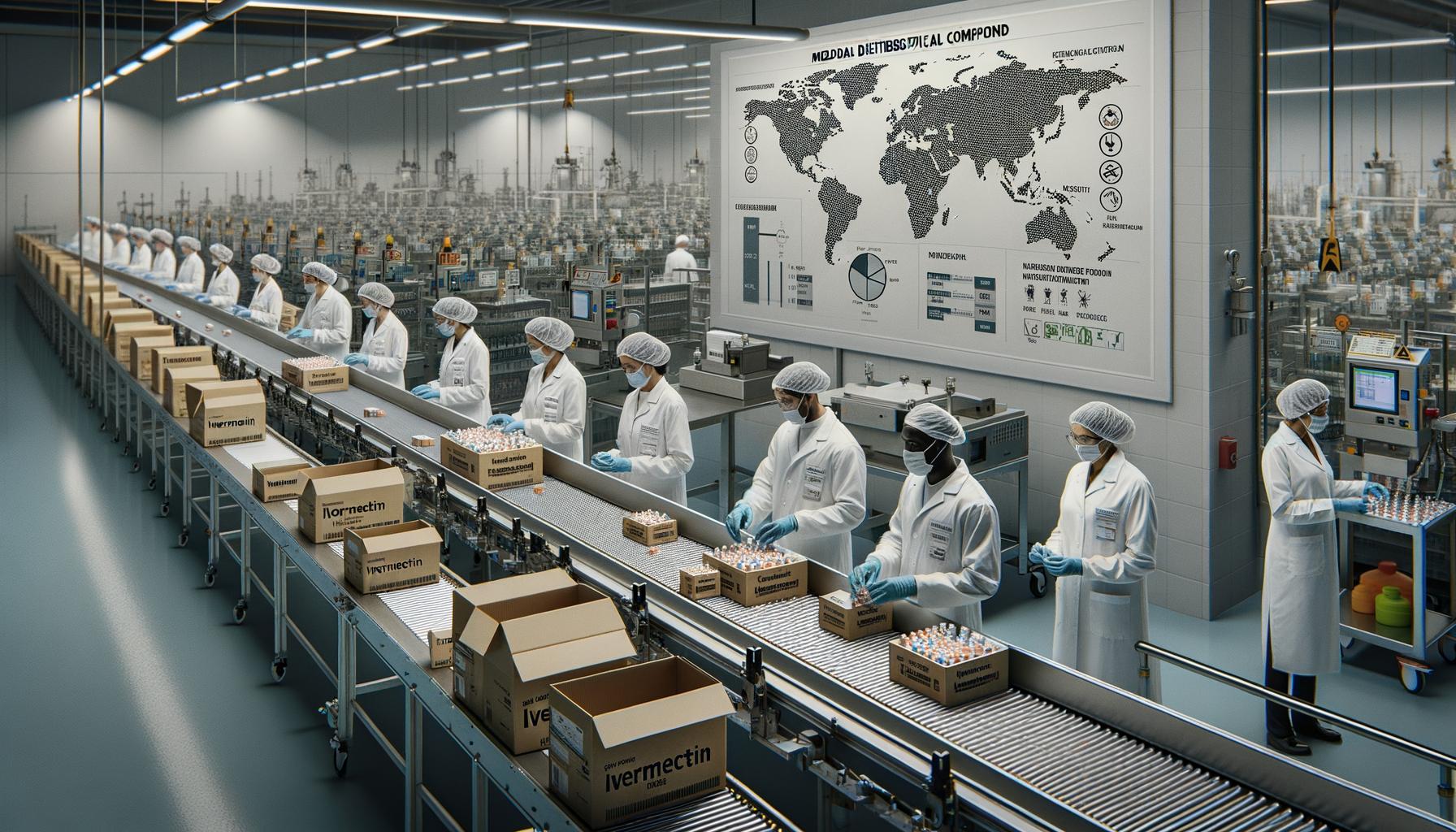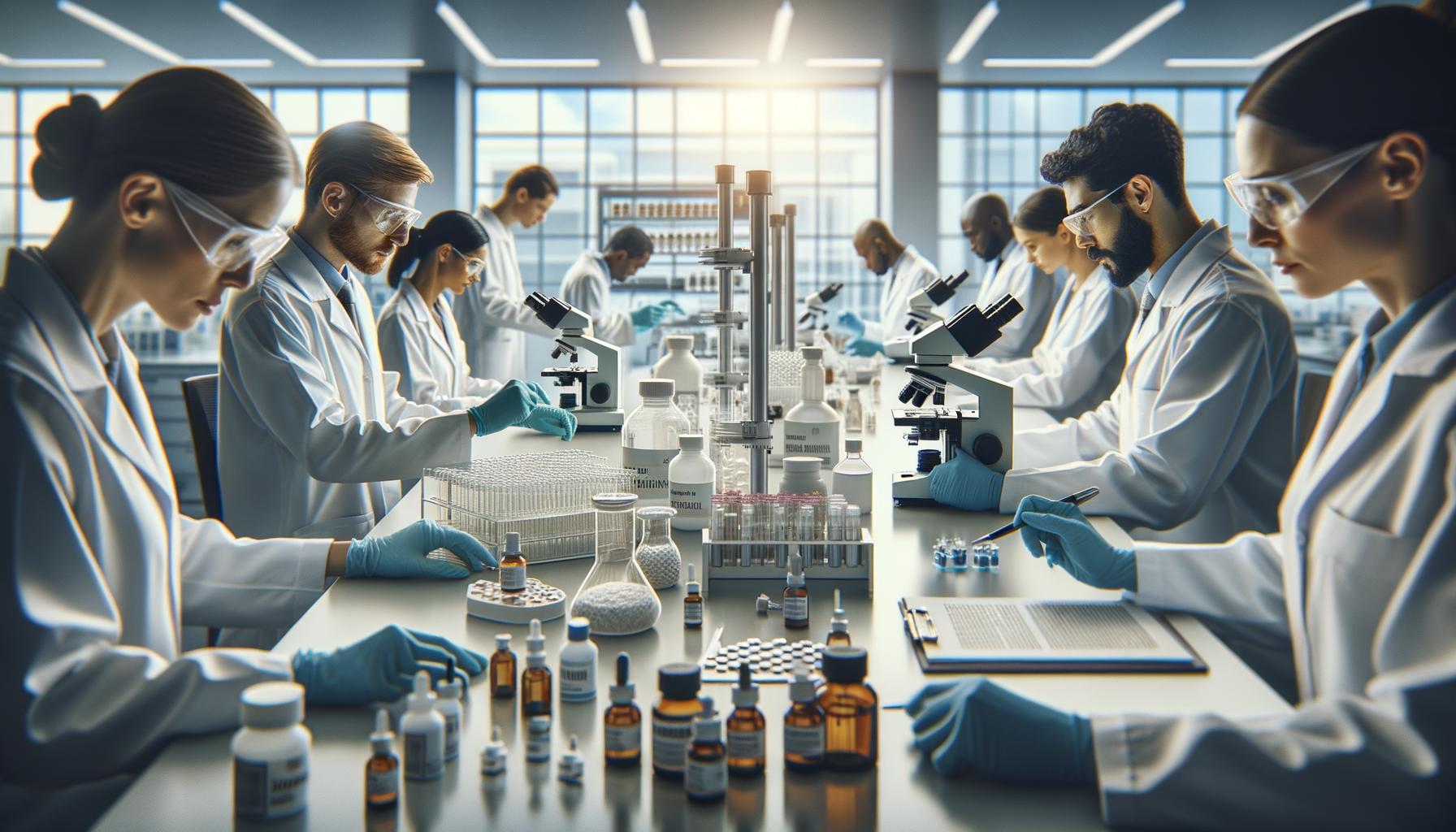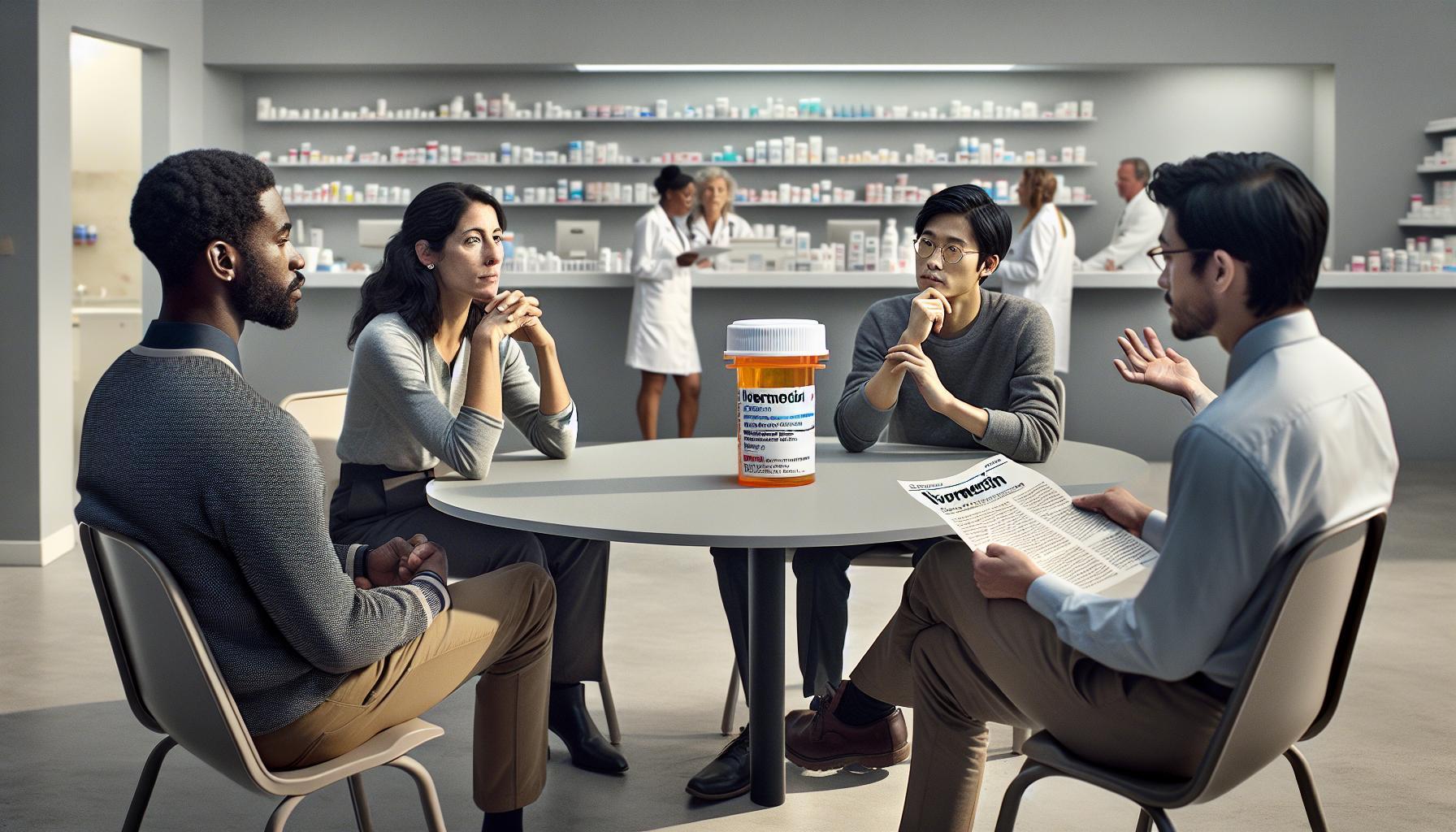Did you know that ivermectin, a widely used anti-parasitic medication, is produced by a diverse range of pharmaceutical manufacturers around the world? Understanding who makes ivermectin is important not only for ensuring drug quality but also for appreciating the global supply chain behind this essential medicine. Whether you’re a healthcare professional, a researcher, or simply curious, knowing the leading producers helps you navigate reliable sources and stay informed about the drug’s availability and standards. This overview explores key pharmaceutical companies involved in ivermectin production, highlighting their roles and commitments to safety and quality. While ivermectin has proven benefits for certain parasitic infections, it’s crucial to approach information about its uses responsibly and consult healthcare providers for medical advice. By gaining insight into the manufacturers, you’re empowered to make better-informed decisions and understand the pharmaceutical landscape supporting this important medicine. Let’s delve into the trusted names behind ivermectin and what sets them apart in the industry.
Who Produces Ivermectin? An Overview of Manufacturers
Ivermectin’s production is a global effort involving a variety of manufacturers, from specialized chemical producers to large, well-established pharmaceutical companies. This broad manufacturing base ensures steady availability but also means that product quality and origins can vary, making it essential for consumers and healthcare providers to understand who is behind the ivermectin they use.
Many ivermectin active pharmaceutical ingredients (APIs) originate from manufacturers in China and India, where chemical companies have developed efficient synthesis processes. Examples include firms such as Changzhou Comwin Fine Chemicals, Aurora Industry, and Shandong Qilu King-Phar, which supply raw ivermectin materials to pharmaceutical formulators worldwide. This upstream production is critical since these manufacturers provide the building blocks that other companies rely on for finished medicines [[3]](https://pharmaoffer.com/api-excipient-supplier/antiparasitics/ivermectin/fda).
In the realm of finished ivermectin products-tablets, creams, and injectables-the landscape includes both international pharmaceutical giants and smaller generic drug producers. Notably, companies like Dr. Reddy’s Laboratories in India have entered markets such as the United States, partnering with firms like Senores Pharmaceuticals to expand access to affordable generic ivermectin tablets. This competition has helped reduce prices and increase availability in a market valued at around $20 million in the US alone [[2]](https://www.stocktitan.net/news/RDY/dr-reddy-s-laboratories-and-senores-pharmaceuticals-inc-announce-the-ol549p9yn8y3.html).
When looking for ivermectin, understanding the supply chain helps navigate questions on authenticity and safety. Reputable manufacturers follow stringent regulatory guidelines to ensure purity and efficacy, often indicating a purity level above 95% for APIs and compliance with pharmacopeial standards. Buyers should prioritize products from suppliers who provide transparent quality documentation and are approved by recognized health authorities. Practical advice includes verifying supplier certifications and consulting healthcare professionals when choosing a particular brand or source.
- Upstream API producers: Mainly in China and India, supplying raw ivermectin material.
- Generic pharmaceutical companies: Firms like Dr. Reddy’s producing finished dosage forms for various markets.
- Quality certification: Confirming manufacturing standards is key for safe and effective treatment.
Understanding who produces ivermectin not only promotes informed choices but also highlights the interconnected global network behind this important antiparasitic medication. Seeking products from established manufacturers with verifiable credentials is the best step toward ensuring both safety and effectiveness.
The Science Behind Ivermectin: Understanding Its Development

Ivermectin’s journey from a soil-derived compound to a globally essential medication exemplifies groundbreaking pharmaceutical science. Originally discovered in the late 20th century through a natural fermentation process involving the bacterium *Streptomyces avermitilis*, ivermectin quickly distinguished itself for its potent anti-parasitic effects. This complex molecule works by targeting nerve and muscle cells of parasites, causing paralysis and death, which makes it highly effective against a range of parasitic infections. Understanding the detailed chemistry and biological mechanisms behind ivermectin underpins why it remains a cornerstone of antiparasitic therapy worldwide.
The development process of ivermectin involved meticulous efforts to isolate, characterize, and synthesize the active components for pharmaceutical use. Early chemists faced the challenge of producing ivermectin at scale without compromising its purity or efficacy. Advances in fermentation technology and semi-synthetic methods now allow manufacturers primarily in China and India to produce highly pure active pharmaceutical ingredients (APIs) reliably. These APIs are then formulated into various dosage forms – tablets, creams, and injectables – adapted for different therapeutic uses. This multistep process highlights the importance of integrating chemistry, microbiology, and pharmaceutical engineering in drug manufacturing.
The Science of Ivermectin Production
- Fermentation and Extraction: Industrial production begins with fermentation of *Streptomyces* cultures, from which ivermectin analogs are extracted.
- Semi-Synthetic Modification: Chemical steps modify natural products to enhance potency and safety, ensuring the optimal balance for human use.
- Quality Control Measures: Consistent testing for purity (often >95%), potency, and stability ensures each batch meets stringent pharmacopeial standards.
These scientific achievements underpin why reputable manufacturers invest heavily in process control and validation. For consumers and healthcare professionals, it means that sourcing ivermectin from well-established pharmaceutical producers is essential for ensuring the medicine’s safety and therapeutic effectiveness. As you explore ivermectin products, understanding this sophisticated development pathway empowers you to appreciate the care and expertise that go into every dose, and why counterfeit or substandard products can jeopardize treatment outcomes.
Ultimately, the science behind ivermectin is a testament to the power of interdisciplinary collaboration-from microbiologists to chemical engineers-to transform a natural substance into a vital medication trusted worldwide. Still, it is important to consult qualified healthcare providers regarding ivermectin’s appropriate use and to rely on licensed manufacturers who adhere to globally recognized production standards.
Major Pharmaceutical Companies Involved in Ivermectin Production

Ivermectin’s production involves a blend of multinational pharmaceutical giants and specialized manufacturers, reflecting its importance in global health. One notable example is Dr. Reddy’s Laboratories, a major Indian pharmaceutical company that recently entered the US market with a generic ivermectin tablet formulation. Their partnership with Senores Pharmaceuticals highlights how collaborative ventures ensure broader access to this essential medicine, particularly in markets with high demand like the United States, where ivermectin’s generics compete in a $20 million segment [[1]](https://www.stocktitan.net/news/RDY/dr-reddy-s-laboratories-and-senores-pharmaceuticals-inc-announce-the-ol549p9yn8y3.html).
Beyond these collaborations, many pharmaceutical producers in India and China dominate the supply of ivermectin’s active pharmaceutical ingredient (API). These manufacturers have refined fermentation and semi-synthetic processes to deliver high-purity ivermectin, often exceeding 95% purity standards. Their scale and expertise ensure that formulations-ranging from oral tablets to topical applications-meet strict quality requirements. For readers interested in exploring suppliers or manufacturers, platforms like PharmaCompass provide detailed directories that include information on manufacturing certifications (such as GMP, USDMF) and pricing transparency [[2]](https://www.pharmacompass.com/manufacturers-suppliers-exporters/ivermectin).
Key Players and Market Examples
- Dr. Reddy’s Laboratories: A leader in pharmaceutical generics with strong API manufacturing capabilities, now expanding ivermectin availability in developed markets.
- Senores Pharmaceuticals: Partnering with established firms to localize production and distribution for better market penetration.
- Chinese Manufacturers: Many Chinese suppliers excel in providing ivermectin API with certifications recognized internationally, often serving as primary ingredient sources for global formulators.
- Indian Generic Producers: Home to several companies producing finished formulations for broad regional and international distribution.
This diversified manufacturer base ensures continuity of supply and competitive pricing but also underscores the importance of validating product authenticity and quality. For consumers and healthcare providers, seeking ivermectin manufactured by companies with proven regulatory compliance ensures the safety and efficacy of treatment. Also, readers should be aware that while many producers exist, not all formulations are identical-minor variances in manufacturing processes can impact therapeutic outcomes.
Staying informed about the leading manufacturers not only helps in making educated purchasing decisions but also fosters trust in the medicine’s quality. Remember, ivermectin should always be obtained through licensed pharmacies and prescribed by healthcare professionals to avoid counterfeit or substandard products. This approach maximizes benefits and minimizes risks associated with antiparasitic treatments.
Global Distribution: Where Is Ivermectin Manufactured?

Ivermectin’s production spans several regions, each playing a critical role in ensuring the medicine’s availability worldwide. While many may associate pharmaceutical manufacturing mostly with Western countries, the global supply chain for ivermectin is notably anchored in Asia-especially India and China-where a combination of advanced technology and large-scale facilities meet growing demand efficiently and cost-effectively.
India stands out as a hub not only for finished ivermectin formulations but also as a significant contributor to the active pharmaceutical ingredient (API) supply. Indian companies like Dr. Reddy’s Laboratories have expanded access to ivermectin by introducing generic versions approved by stringent regulatory agencies, including the U.S. Food and Drug Administration (FDA). These manufacturers leverage well-established fermentation and semi-synthetic production techniques to achieve high purity levels, ensuring consistent quality for oral tablets, ointments, and injectable forms.
Meanwhile, China remains a powerhouse for ivermectin API manufacturing, with several suppliers known internationally for compliance with good manufacturing practices (GMP) and certifications that meet global standards. Chinese producers provide large volumes of the raw API, which many pharmaceutical companies worldwide use as a building block for their finished products. Their expertise in cost-effective production helps maintain competitive pricing without compromising quality, though purchasers are encouraged to verify authenticity and suppliers’ certifications carefully.
Regional Highlights and Practical Advice
- India: Strong pharmaceutical infrastructure supports both API and finished dosage forms, with regulatory bodies emphasizing quality control and international certifications.
- China: Extensive network of API manufacturers, many with experience in exporting to varied regulatory markets; known for high-volume production and cost efficiency.
- United States and Europe: Emerging presence primarily focused on formulation, packaging, and distribution; partnerships with Asian API suppliers are common.
For consumers and healthcare practitioners, understanding where ivermectin is manufactured can guide safer choices. Always seek ivermectin products sourced from manufacturers with verifiable certifications such as GMP or USDMF (United States Drug Master File). Reputable suppliers often appear in specialized industry directories like PharmaCompass, which provide transparency around manufacturing standards and quality assurance benchmarks. Ultimately, consulting healthcare professionals before procurement ensures medicine safety, appropriate use, and limits exposure to substandard or counterfeit drugs.
Quality Assurance: Standards for Ivermectin Production

Ensuring the quality of ivermectin is not just about producing an effective drug-it’s about safeguarding health on a global scale. High-quality ivermectin relies on rigorous production standards that protect patients from variability, contamination, or counterfeit products. Manufacturers must adhere to stringent quality assurance protocols throughout every stage, from sourcing raw materials to the final packaged form.
At the core of quality assurance is Good Manufacturing Practice (GMP), a system that enforces consistent production and quality control. Facilities certified under GMP standards are regularly audited to confirm compliance with these regulations. This ensures that each batch of ivermectin meets specific criteria for purity, potency, and safety. For example, API suppliers in China and India-the two key manufacturing hubs-are expected to maintain these standards, providing pharmaceutical companies globally with reliable ingredients [[3]](https://www.sciencedirect.com/science/article/pii/S2405805X18300826). Verifying that a manufacturer holds GMP certification can be a strong first step to confirm product legitimacy.
Key Quality Assurance Components
- Active Pharmaceutical Ingredient (API) Verification: The ivermectin API must be precisely characterized for its chemical structure and purity. Advanced analytical methods like high-performance liquid chromatography (HPLC) are used to detect any impurities that might affect drug safety or efficacy.
- Process Validation: Whether ivermectin is produced via fermentation or semi-synthetic processes, each production step is validated to minimize variability. This includes catalyst usage, such as the rhodium catalyst system in hydrogenation, which must be carefully removed to avoid contamination [[1]](https://patents.google.com/patent/US6072052A/en).
- Stability Testing: Post-production stability tests verify that ivermectin retains its integrity throughout its shelf life, resisting degradation caused by environmental factors such as heat, light, or moisture.
- Packaging Integrity: Proper packaging prevents contamination or product degradation. Quality control extends to labeling accuracy, ensuring that dosing information and manufacturing details are clearly displayed for safe use.
Practical Tips for Healthcare Professionals and Consumers
When procuring ivermectin, seek products manufactured in facilities with transparent quality policies and certifications like GMP or USDMF (United States Drug Master File). Trusted suppliers often list registration numbers or validation certificates on official websites or industry platforms such as PharmaCompass. Additionally, batch numbers and expiry dates on packaging provide essential traceability. Always consult healthcare providers to confirm that the chosen ivermectin product suits clinical needs and meets local regulatory approval.
Reliable manufacturing standards are vital not only to protect individual patients but also to sustain public health efforts against parasitic diseases worldwide. Recognizing the complex quality frameworks behind ivermectin helps consumers make safer choices and supports continued innovation in drug production without compromising patient safety.
Ivermectin’s Role in Treating Parasites and Beyond
Long celebrated for its transformative impact on global health, ivermectin remains a cornerstone in the fight against parasitic infections affecting millions worldwide. Originally discovered in the late 1970s and developed from compounds produced by soil bacteria, this medication works by targeting the nervous system of parasites, such as roundworms, hookworms, and lice. Its efficacy and safety profile have made it essential in treating diseases like onchocerciasis (river blindness) and strongyloidiasis, conditions prevalent in tropical and subtropical regions.
Beyond its classical use in parasitic diseases, ivermectin’s scope has been the subject of extensive research exploring broader therapeutic applications. While some studies have investigated its antiviral properties, particularly relating to early viral clearance of certain infections, regulatory authorities emphasize that current evidence does not support its routine use outside approved indications. This restraint underlines the importance of relying on well-established uses and consulting healthcare professionals before considering ivermectin for off-label purposes.
Practical Considerations for Use
- Targeted Therapy: Ivermectin is most effective when prescribed for specific parasitic infections backed by clinical evidence. Using it appropriately helps avoid resistance development and ensures optimal patient outcomes.
- Dosing and Administration: Dosages vary depending on the condition treated. Accurate dosing is critical and should always be guided by healthcare providers familiar with ivermectin’s uses and contraindications.
- Global Public Health Role: Mass drug administration programs often include ivermectin to control parasitic diseases in endemic regions, demonstrating the drug’s role not only in individual care but also in public health strategies.
Awareness of its scientifically validated role empowers consumers and healthcare providers to make informed decisions. While innovation is ongoing, relying on trusted manufacturers to supply quality-assured ivermectin ensures access to the medication in its most effective and safe form. Always seek expertise from medical professionals when considering ivermectin to balance benefits with potential risks appropriately.
Research and Development: Innovations in Ivermectin Use
Few medications match the scientific and practical legacy of ivermectin when it comes to transforming global health through innovation. The continuous evolution of ivermectin usage reflects a blend of advancing pharmaceutical research and the diverse needs of worldwide populations battling parasitic diseases. Manufacturers and researchers alike remain committed to refining formulations and exploring new applications, always grounded in rigorous evidence.
Pharmaceutical producers, including established generic manufacturers, invest in optimizing ivermectin’s delivery systems. For example, efforts to improve oral bioavailability-how well the drug is absorbed in the body-have led to more patient-friendly tablets and formulations suited for mass drug administration programs. Such innovations help ensure consistent dosing, especially in challenging environments where parasitic infections are most prevalent.
Researchers also examine ivermectin’s potential beyond its traditional anti-parasitic role. While some experimental studies have explored antiviral and anti-inflammatory properties, reputable manufacturers and regulators emphasize that these areas require careful study and validation to guarantee safety and effectiveness. This cautious approach protects public health and maintains confidence in ivermectin’s established uses.
Supporting Informed Usage Through Industry Collaboration
- Improved Formulations: Advances in pharmaceutical technology enhance ivermectin’s stability and ease of administration, which is critical for large-scale health interventions.
- Combination Therapies: Some research focuses on ivermectin used alongside other antiparasitic agents, aiming to broaden the spectrum or improve treatment outcomes.
- Ongoing Clinical Trials: Manufacturers often partner with academic institutions and global health organizations to conduct studies ensuring ivermectin’s efficacy and monitoring resistance development.
By continuously advancing production methods and clinical research, leading ivermectin producers uphold high-quality standards while responding to emerging health challenges. As a user or healthcare provider, recognizing these innovations empowers you to trust that you are accessing medications backed by a commitment to safety, efficacy, and scientific progress. Always consult healthcare professionals to understand how new developments might relate to your specific health needs.
Regulatory Oversight: How Ivermectin Is Approved and Monitored
The approval and ongoing monitoring of ivermectin involve a complex network of regulatory agencies worldwide, ensuring the medication’s safety, quality, and efficacy for public use. Every country requires manufacturers to submit detailed evidence from rigorous clinical trials and quality assessments before ivermectin can be marketed. This process includes evaluating the drug’s manufacturing consistency, dosage accuracy, and safety profile, often aligned with internationally recognized guidelines such as those from the World Health Organization (WHO).
Pharmaceutical companies producing ivermectin must adhere to strict Good Manufacturing Practices (GMP), a set of standards designed to guarantee that each batch meets quality requirements. Regulatory bodies like the U.S. Food and Drug Administration (FDA), the European Medicines Agency (EMA), and other national authorities routinely inspect manufacturing facilities, review production protocols, and verify that labeling and packaging accurately reflect the approved use. These steps help prevent contamination, dosage errors, and misbranding, safeguarding patients worldwide.
Ongoing Surveillance and Adaptation
- Post-Market Surveillance: After ivermectin reaches the market, regulators and manufacturers collaborate to monitor adverse events and report any unexpected side effects. This vigilance helps maintain an up-to-date safety profile.
- Updates in Use Guidelines: As scientific knowledge evolves, recommendations on ivermectin’s approved indications may be revised to reflect new evidence, reinforcing evidence-based prescribing.
- Coordination with Public Health Initiatives: Regulatory frameworks often integrate ivermectin distribution into disease control programs, balancing access with appropriate medical oversight to reduce misuse.
This rigorous oversight also addresses emerging concerns such as counterfeit medications. Enforcement of authentication measures and licensing requirements limits the circulation of fake or substandard ivermectin products, which can threaten both individual health and the broader trust in pharmaceutical supply chains. Pharmacists and healthcare providers play a crucial role by sourcing ivermectin from legitimate manufacturers and informing patients about safe use.
Ultimately, while regulatory approval ensures ivermectin’s foundational safety and efficacy, patients and healthcare professionals must remain informed and vigilant. Discuss any treatment questions with qualified providers who consider regulatory guidance alongside individual health needs, ensuring that ivermectin’s benefits are realized safely and responsibly.
Counterfeits and Authenticity: Ensuring Safe Ivermectin Access
Counterfeit ivermectin continues to pose a significant risk to public health, undermining trust in genuine pharmaceutical products and placing consumers in danger due to inconsistent or insufficient active ingredients. Reports reveal that numerous unregistered ivermectin products imported globally have tested counterfeit, often containing lower levels of the active drug-or none at all-than what is stated on their labels. Such discrepancies not only reduce effectiveness but can also lead to harmful side effects or contribute to the development of drug resistance. Because of this, staying vigilant about the authenticity of ivermectin is crucial.
How to Identify and Avoid Counterfeit Ivermectin
- Purchase from Licensed Pharmacies: Always acquire ivermectin from reputable pharmacies or licensed healthcare providers who source their stock from recognized manufacturers following strict regulatory approvals.
- Verify Packaging and Labeling: Genuine ivermectin products will have consistent branding, clear batch numbers, expiry dates, and regulatory approval marks such as FDA or EMA certifications. Be cautious of packaging that appears tampered with, poor print quality, or vague manufacturer details.
- Consult Healthcare Professionals: Before using ivermectin, discuss with a qualified medical provider who can recommend safe sources and appropriate dosing, reducing the chances of misuse or exposure to counterfeit versions.
- Report Suspicious Products: If you suspect a counterfeit product, contact national regulatory agencies or authorities such as the Therapeutic Goods Administration (TGA) in Australia, which actively monitors and investigates counterfeit ivermectin cases.
Why Regulatory Oversight Matters
Stringent regulatory frameworks serve as gatekeepers, ensuring that ivermectin entering the market conforms to rigorous manufacturing and safety standards. Agencies routinely inspect manufacturing sites, require clinical data submissions, and test products post-distribution to detect fraud or deviations. Enforcement actions, including fines and recalls, are issued when counterfeit batches are identified. Despite these efforts, counterfeit ivermectin remains a challenge due to global supply chain complexities and online sales channels, which are harder to regulate. Awareness campaigns and collaboration between governments, healthcare providers, and consumers enhance protection against these risks.
Consumer Empowerment Through Education
Understanding that counterfeit ivermectin may not only be ineffective but potentially dangerous empowers consumers to take proactive steps. Educating oneself about the names of legitimate manufacturers, approved formulations, and legal purchase channels builds a first line of defense. Equally important is recognizing that ivermectin is a prescription medication with specific uses, and using it without proper medical advice-especially from dubious sources-can lead to adverse health outcomes. Consult trusted healthcare professionals and rely on verified sources for treatment decisions to ensure both safety and therapeutic benefit.
By prioritizing authenticity and verifying ivermectin sources carefully, individuals contribute to their own well-being and help maintain the overall integrity of critical treatments for parasitic diseases worldwide.
Consumer Awareness: Recognizing Legitimate Ivermectin Sources
Ivermectin’s proven benefits hinge on using products that are both genuine and correctly sourced. Unfortunately, counterfeit versions often flood the market, varying widely in quality and sometimes containing little to no active ingredient. This reality makes it essential for consumers to sharpen their ability to discern authentic ivermectin from harmful fakes. Taking control starts with knowing where and how legitimate ivermectin is distributed, and understanding the markers that indicate a trustworthy product.
Start by always obtaining ivermectin through licensed pharmacies and healthcare providers. These outlets source their inventory directly from reputable manufacturers who comply with strict regulatory standards. Authentic ivermectin products carry clear, standardized packaging featuring distinct manufacturer logos, lot or batch numbers, and expiration dates. Regulatory approval symbols-such as those from the U.S. Food and Drug Administration (FDA) or the European Medicines Agency (EMA)-add another layer of confirmation. If packaging looks tampered with, labels are blurry, or manufacturer information is missing, these are red flags signaling potential counterfeit risks.
Before initiating any ivermectin use, consulting a qualified healthcare professional is paramount. Not only can they prescribe the correct dose and treatment duration for your specific condition, but they also guide you towards verified sources. Healthcare providers often have direct ties or knowledge of local distributors and can help you avoid unregulated channels, including online marketplaces notorious for counterfeit or substandard ivermectin.
- Prefer prescriptions filled through recognized pharmacies with regulatory oversight.
- Check packaging for consistent branding, clear labeling, and regulatory marks.
- Consult healthcare professionals before starting or changing ivermectin treatment.
- Report suspicious products to national authorities such as the Therapeutic Goods Administration (TGA).
Fostering awareness also means becoming familiar with leading pharmaceutical producers whose names are associated with quality ivermectin formulations. Trusted manufacturers adhere to internationally recognized quality standards throughout production and distribution, making their products the gold standard. While counterfeiters may replicate packaging superficially, they rarely replicate full documentation or transparency around the product’s origin.
Remaining alert and informed prevents exposure to ineffective or dangerous alternatives, preserves the efficacy of ivermectin treatments globally, and protects overall public health. Your diligence, combined with collaboration from regulatory officials and health professionals, forms a robust defense against counterfeit medicines and empowers safer therapeutic outcomes for all.
Future of Ivermectin: Trends and Market Outlook
Ivermectin’s future is shaped by evolving global health needs and the pharmaceutical industry’s commitment to innovation and quality manufacturing. As demand for antiparasitic treatments continues worldwide, manufacturers are investing in advanced production technologies to enhance purity, scalability, and supply chain transparency. This means that over the coming years, consumers and healthcare providers can expect more reliable access to products that meet stringent international quality and safety standards.
Manufacturers are also exploring expanded uses of ivermectin, including new formulations for veterinary and human health. While the drug’s antiparasitic effectiveness remains its core application, ongoing research strives to optimize dosing, reduce side effects, and explore potential roles in neglected tropical diseases. However, it is important to note that scientific consensus continues to advise caution regarding off-label claims, underscoring the need for evidence-based use supported by regulatory oversight.
Market Dynamics and Manufacturing Trends
- Geographic diversification: Production hubs remain centered in China and a few key countries such as Denmark and the United States, with most active pharmaceutical ingredients (APIs) sourced from established manufacturers there, ensuring consistent standards and supply reliability.
- Regulatory harmonization: Manufacturers increasingly align with guidelines from the FDA, EMA, and other global agencies to facilitate broader market access, improving the availability of quality-assured ivermectin worldwide.
- Counterfeit deterrence: Enhanced tracking technologies like serialization and blockchain are being adopted in packaging to combat counterfeit products and increase consumer confidence.
Healthcare providers and patients are encouraged to stay informed about these developments and to prioritize ivermectin products from manufacturers with verifiable certifications such as GMP (Good Manufacturing Practices) and valid drug master files. Being vigilant in sourcing ivermectin helps safeguard treatment efficacy and supports public health goals.
As the pharmaceutical landscape adapts, the outlook for ivermectin is cautiously optimistic-grounded in scientific rigor and responsible manufacturing practices. This ensures the drug’s continued role as a trusted treatment for parasitic infections, while allowing space for future innovations guided by thorough clinical research.
Frequently Asked Questions
Q: How can I verify if an Ivermectin manufacturer is certified and follows quality standards?
A: To verify an Ivermectin manufacturer’s certification, check for GMP (Good Manufacturing Practices) and regulatory approvals like USDMF or CEP certificates. Trusted suppliers provide documentation that confirms compliance with global quality standards, ensuring safe and authentic Ivermectin products. Always purchase from verified sources to avoid counterfeits [[2]].
Q: What are the primary challenges faced by manufacturers of Ivermectin today?
A: Ivermectin manufacturers face challenges like ensuring supply chain integrity, combating counterfeit products, and meeting stringent regulatory standards. Additionally, balancing production for both human and veterinary use requires careful quality control to maintain efficacy and safety [[1]].
Q: Why do some pharmaceutical companies focus on Ivermectin API manufacturing rather than finished products?
A: Some companies specialize in producing the Active Pharmaceutical Ingredient (API) of Ivermectin to supply other manufacturers who formulate finished medicines. This focus allows for efficient scale-up, specialized quality assurance, and meeting diverse market needs globally [[2]].
Q: How does the geographical location of Ivermectin manufacturers impact drug availability?
A: The location of Ivermectin manufacturers affects distribution speed, cost, and regulatory compliance. Regions with established pharmaceutical infrastructure can supply globally faster, while emerging markets rely on imports. Local production supports better access but requires robust quality oversight [[1]].
Q: When did major pharmaceutical companies start producing generic Ivermectin in markets like the US?
A: Major companies such as Dr. Reddy’s began launching generic Ivermectin tablets in the US market recently, expanding options for affordable treatment. Generic production boosts accessibility and competition, enhancing healthcare outcomes in parasitic disease management [[3]].
Q: What role do online platforms play in connecting buyers with legitimate Ivermectin manufacturers?
A: Online marketplaces with rigorous quality control and verification procedures help connect buyers to verified Ivermectin suppliers, preventing fraud. These platforms provide detailed manufacturer credentials, batch testing data, and compliance certificates, improving transparency and trust [[1]].
Q: How can healthcare providers ensure they source authentic Ivermectin from leading producers?
A: Healthcare providers should source Ivermectin from licensed pharmaceutical distributors or verified manufacturers with transparent GMP certifications. Confirming batch traceability and consulting updated regulatory approvals guarantees authenticity and patient safety [[1]][[2]].
Q: What future trends might influence Ivermectin manufacturing globally?
A: Future trends include increasing automation, stricter regulatory oversight, and expansion of generic markets. Innovations in formulation and scaling API production will also likely reduce costs and increase global availability, improving treatment reach for parasitic infections [[1]][[2]].
Feel free to explore our detailed article sections for deeper insights into leading Ivermectin producers and manufacturing standards.
In Conclusion
Understanding the key manufacturers behind ivermectin provides valuable insight into its global availability and quality standards. Leading pharmaceutical producers such as Dr. Reddy’s and Senores Pharmaceuticals have made significant strides in supplying generic ivermectin tablets, helping meet market demands and ensuring accessibility. Whether you’re exploring treatment options or industry trends, knowing who produces ivermectin can empower you to make informed decisions about sourcing and usage.
For those eager to learn more, explore our related guides on antiviral medications and pharmaceutical manufacturing processes. Stay updated by subscribing to our newsletter for the latest research and market developments on ivermectin and similar generic drugs. If you have questions or want to share your experiences, please comment below-we value your input and foster an informed community. Your journey to understanding ivermectin’s role in healthcare starts here, and we’re here to support it with accurate, transparent information you can trust.





